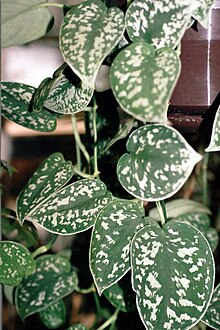Scindapsus pictus—commonly called satin pothos, silver pothos, or silver vine—is a species of flowering plant in the aroid or arum family, Araceae, native to Bangladesh, Borneo, India, Java, Peninsular Malaysia, the Philippines, Sulawesi, Sumatra, Taiwan and Thailand.[2] The Latin specific epithet pictus means "painted", referring to the variegation on the leaves.[3]
| Scindapsus pictus | |
|---|---|

| |
| Scindapsus pictus. | |

| |
| Example of "shingling" growth habit. | |
| Scientific classification | |
| Kingdom: | Plantae |
| Clade: | Tracheophytes |
| Clade: | Angiosperms |
| Clade: | Monocots |
| Order: | Alismatales |
| Family: | Araceae |
| Genus: | Scindapsus |
| Species: | S. pictus
|
| Binomial name | |
| Scindapsus pictus | |
| Synonyms[1] | |
| |
Growth characteristics edit
Capable of growing to around 3 m (10 ft) tall, S. pictus is an evergreen climber (liana), growing upwards and out from roots and ending in the newest leaf. Along the underside of the vine (which is the plant's stem) are nodes, generally appearing every few centimeters, which produce anchoring roots that enable the plant to grow taller and find more light. The roots are sticky to the touch and will adhere to any firm surface, including rocks, cement, brick, logs and trees. Adjacent to each root node is usually a leaf node, sprouting from the opposite (top) side of the vine. Unlike other related genera, the leaves are a matte, seafoam-pine green hue, often covered in silver blotches of variegation. Similar to other aroid genera (such as Epipremnum or Syngonium), the insignificant flowers of S. pictus are rarely seen in cultivation, as vegetative reproduction (i.e., taking cuttings or root division) is the most common method of propagation.
With a minimum outdoor temperature requirement of 15 °C (59 °F), this plant is widely cultivated as a houseplant in temperate regions around the world, and outdoors in appropriate climes. It typically grows, somewhat slowly, to around 90 cm (35 in).[4] However, if provided with an adequate support structure, such as the side of a building or a wall, or a tree or a wide pole, S. pictus vines often grow faster and higher towards sunlight, with the leaves eventually "shingling" (growing in a flattened position) against the support, in an effort to achieve maximum photosynthetic benefit beneath the forest canopy.
Varieties edit
Several hybrids, varietals and cultivars have been developed, including S. pictus 'Silvery Anne', 'Silver Lady', 'Silver Satin' and 'Silver Splash'. S. pictus 'Jade Satin' is known for its matte, pastel-green leaves, featuring minimal to no variegation. The popular 'Exotica' is widely grown for its exceptionally large, silver and white leaves. The most common cultivar, 'Argyraeus', has gained the Royal Horticultural Society's Award of Garden Merit.[5][6]
References edit
- ^ "The Plant List: A Working List of All Plant Species". Retrieved May 16, 2014.
- ^ Kew World Checklist of Selected Plant Families
- ^ Harrison, Lorraine (2012). RHS Latin for gardeners. United Kingdom: Mitchell Beazley. p. 224. ISBN 9781845337315.
- ^ RHS A-Z encyclopedia of garden plants. United Kingdom: Dorling Kindersley. 2008. p. 1136. ISBN 978-1405332965.
- ^ "Scindapsus pictus". RHS. Retrieved 5 March 2021.
- ^ "AGM Plants - Ornamental" (PDF). Royal Horticultural Society. July 2017. p. 96. Retrieved 7 November 2018.